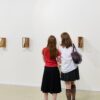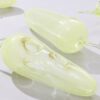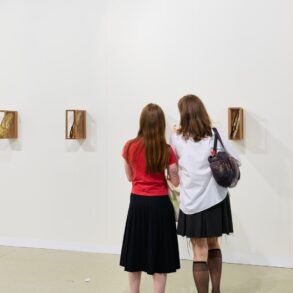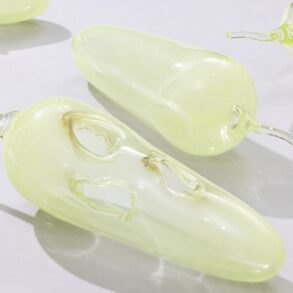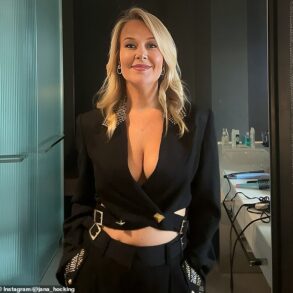Oxford is a city that lives, breathes and thrives on art. World Atlas recently dubbed the city “the cultural mecca of the South” in a piece listing the 12 best cities for retirement in the Southern United States.
Female artists, particularly, have made their presence known in town across a variety of mediums. Musical venues, art galleries and local businesses have helped spotlight these artists. Heartbreak Coffee, for example, is a hub for emerging artists, hosting IRIS Room — a multi-format art show.
Fatimah Wansley
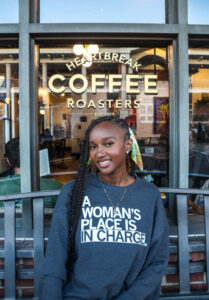
Fatimah Wansley, a junior African-American studies major from Jackson, Miss., is a poet who has performed at IRIS Room.
“It was my freshman year in April, and I was so nervous, not because I’m scared to talk or get in front of people — I’ve been doing that my whole life. But I really just started sharing the things that I write,” Wansley said. “I felt so empowered.”
Wansley — a self-diagnosed dramatic — said her love of poetry sprouted from a few places: theater, speech and debate. Wansley finds purpose in spaces where she can “give something to someone, and they can give something to (her).”
She found that her favorite performance outlet was poetry and prose. Once Wansley knew that poetry was her calling, she became deeply immersed in writing and performing it.
“A friend once told me that I am walking poetry,” Wansley said. “(Poetry) feels like I’m talking to people. Yes I’m on stage, but we’re also having a really intimate and personal conversation. And even if you can’t relate to the subject matter, people are still touched, and that’s meaningful to me.”
Over the course of Wansley’s three-ish years writing poetry seriously, she has completed more than 200 pieces. Among her collection, Wansley has many love-centered poems, but she does not consider herself a “love poet.”
“I think that, as women, we are pushed to have these perceptions of ourselves and these perceptions of love while we’re so young, and we’re supposed to have it all figured out,” Wansley said. “That’s just not true.”
Wansley’s work reflects platonic and romantic love, but ultimately, she aims to invoke connection.
“I think that it’s important to connect with women who are also going through some of the same things I’ve gone through,” Wansley said. “Everyone has gone through a breakup before, but their TikTok advice for breakups and then poets’ advice for breakups are two totally different things. It’s because it’s more humanized.”
Eliza Oakley
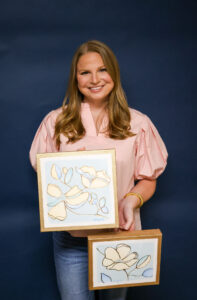
Connection between female artists and their audience arrives in other artistic formats, too.
Take Eliza Oakley, a first-year graduate student studying speech language pathology from Southaven, Miss.
During her undergraduate experience at Ole Miss, Oakley — a visual artist who is handy with a paintbrush — hopped on the birthday sign trend. She was so successful that she had to stop taking commissions because she received so many requests.
“It’s hard to find balance because during the week, I’m so busy (with) class, clinic and homework. So, usually during the week, I don’t really have time to paint,” Oakley said. “Most of the time, I try to make sure that I have time for myself on the weekends, and that’s when I paint.”
The painter was initially inspired by her father. When she turned seven years old, her mother enrolled her in art lessons.
“My dad would paint, and so I would do it with him,” Oakley said. “Some of his paintings were in my room growing up, so I’d see them. Seeing what he created made me want to do something similar.”
Oakley’s artistic origins and desire to slow down have not slowed down what most artists experience — pressure.
“Even though I am kind of creating it for myself, there is (still) a pressure to make something good,” Oakley said. “Whenever I make art, I want to be proud of it, and I know anything I make I should be proud of. But sometimes it’s hard if I feel like I didn’t do my best.”
Despite her desire to be perfect with her art, Oakley acknowledges that she thinks all artists should be proud of their work. She is encouraged by being a female artist in Oxford.
“To even think that I could be considered a female artist in Oxford is kind of crazy,” Oakley said. “It makes me feel like I’m actually doing something with my art, just because there are so many inspiring women that create art in Oxford.
Annabeth Moore
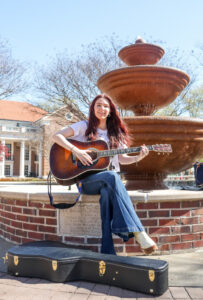
In tandem with Wansley, Oakley agreed that Oxford is a place that supports the arts well. Junior English education student and vocalist Annabeth Moore agrees, but she has cited some difficulties with breaking through and getting gigs around town.
“(Oxford) really is supportive of the (arts) scene, but also it is kind of hard, especially for more of a starting-out artist,” Moore said. “If you don’t already have somewhat of a platform, it’s kind of hard to find places to play here.”
After cracking into the Oxford scene by appearing as a guest at The Green at Harrison’s and a few other nearby venues, Moore believes many of the locations are great with supporting her and her alternative sound.
The support Moore has experienced in Oxford feels particularly special for her. She transferred to the university after graduating from Northeast Mississippi Community College in May.
“To me, this place is like a second home,” Moore said. “I grew up coming to football games here, and my dad went here, my brother went here. So, it’s just kind of like a home already.”
Moore, a Booneville, Miss., native, wants to pursue music full time once she graduates. Therefore, with her transition to the University of Mississippi came difficulties finding balance between her passion and school.
“I have like three papers a week, and then I try to fit in time to go home on the weekends to perform at a gig or something like that,” Moore said. “It gets really stressful, but I’m fortunate enough to have time between classes that I can really sit down and work on stuff; and I’m also fortunate enough to have supportive parents who help me go in between the two.”
The balance problem is shared by all three women, but they agree that what they are doing as female artists in Oxford is important. Wansley, specifically, recognized the platform that Oxford has gifted her and why being a female artist in Oxford is an important role.
“Being able to be raw … for other women and with other women helps to build sisterhood and community,” Wansley said. “Some of these things that I’m saying are some of these exact same things that you’ve felt before in your life, but you haven’t felt comfortable to say them. But seeing someone that is comfortable saying them makes you feel safe.”
This post was originally published on this site be sure to check out more of their content

